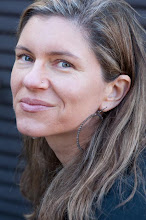March is National Nutrition Month, so what better place to start than nutritional strategies for keeping your girls healthy? I chatted with Dr. Helayne Waldman, EdD, a professor at Bauman College of Holistic Nutrition and author of an upcoming book on Breast Cancer Prevention, publish date January, 2012. Helayne has my fave combo: authentic, brilliant and down to earth. She is teaching an upcoming seminar at the Gottfried Center that starts next week (see details below).
SG: Why do women wait until they have the bad news (breast cancer, DCIS, atypical hyperplasia) before getting proactive about aggressive prevention? Is it fear? Is it that we're too busy to bother - the risk hasn't gotten to the top of the heap yet? You get a bad breast diagnosis, and suddenly being proactive is the top of the heap. But there are so many risk factors we can modify before the diagnosis!
HW: Women need to know they can dramatically modify their risk by getting their vitamin D up, insulin levels down, inflammation down, iodine up -- they can reduce their risk of breast cancer by 50-90%.
SG: Let's talk about toxins in the environment. I find many women don't want to hear about it - there's something dull or dry or unsexy or inevitable or fatalistic that happens in their brains and they tune out when the subject turns to xenoestrogens (chemicals that act falsely like fake estrogen in your body and may increase risk of breast cancer). Can you give us some tantalizing sound bites here to grab the attention of the busy women readers? Let's take nanoparticles in my cosmetics. Short version: what do I need to know about why they're bad & what's the alternative?
HW: Nanoparticles in conventional cosmetics are particularly dangerous. Because of their minute size, they can easily cross into blood vessels and then get dispersed all over the body. Do you really want plastics, artificial fragrances, dyes, heavy metals and petroleum particles traveling around in your bloodstream?
SG: Let's turn now to the controversy on goitrogens. I find it curious that most of what is good for the boobs is also good for the thyroid, but there are certain foods that are good for breast health, but can block thyroid function. What gives? Some folks say if you take goitrogens such as cruciferous vegetables (e.g., broccolli) and cook it - no worries, goitrogenic activity goes away. We talked recently about the opinion of Chris Masterjohn (Weston Price thought leader) - what are the two sides to this story (cooked goitrogens ok vs maybe still bad for thyroid)? Can you enlighten me?
HW: Soy is controversial because of its known anti-nutrients such as trypsin inhibitors and goitrogens. Most (but not all) experts feel that fermenting the soy will help to destroy these “anti-nutrients”. My own advice is that if you want to eat soy, make sure it’s organic (non organic is GMO) ,fermented and eaten in moderation (stay especially away from “fake” soy foods like soy protein isolate, soy hot dogs, soy ice cream etc which are highly processed with a brew of toxic ingredients.) The Whole Soy Story by Kaayla Daniels is the best researched, most comprehensive look at soy I’ve ever seen and I highly recommend it.
SG: Coconut oil. Why so good? Is it omega 6 vs 3 or something else entirely? How does it compare to olive oil? How does it act as an anti-inflammatory?
HW: Coconut oil is great on many fronts. The main saturated fat in cocnut oil is lauric, known as a medium chain fatty acid.(does not contain appreciable amounts of Omega 3 or 6) These fats are good to burn for quick energy, actually BOOST metabolism (leading some to lose weight) and increase levels of HDL. It’s also considered a great anti-fungal agent, so can be excellent for yeast and other pathogens in the intestines. And it’s really amazing for your skin. Put some on and try it for yourself!
HW: Coconut oil is great on many fronts. The main saturated fat in cocnut oil is lauric, known as a medium chain fatty acid.(does not contain appreciable amounts of Omega 3 or 6) These fats are good to burn for quick energy, actually BOOST metabolism (leading some to lose weight) and increase levels of HDL. It’s also considered a great anti-fungal agent, so can be excellent for yeast and other pathogens in the intestines. And it’s really amazing for your skin. Put some on and try it for yourself!
SG: What are we forgetting?
HW: There is a problem with American hubris. We stick our head in the sand about toxins in the environment, about GMOs, about prevention. We have magical thinking about toxins or breast cancer not being a problem for us. We are special and it won't bother us. It filters down from the aggregate to the individual. Well, guess what: it is a problem!
SG: Let's get busy, Readers! Post a comment or ask a question if you have more for Dr. Helayne.
Check out Dr. Helayne in person at our upcoming "Radical Breast Health" workshop starting March 10. Click here to register.


1 comment:
Thanks for posting this!
Post a Comment